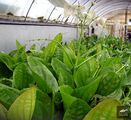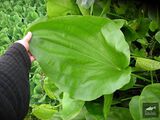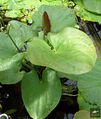Echinodorus floribundus (Seub.) Seub.

Basionym of : Aquarius floribundus (Seub.) Christenh. & Byng
Synonyms:
Alisma floribundum Seub.
Alisma pubescens var. claussenii Seub.
Sagittaria brasiliensis Mart.
Sagittaria brasiliensis Mart. ex Micheli
heterotypic synonym : Echinodorus grandiflorus subsp. aureus (Fassett) R.R.Haynes & Holm-Niels.
heterotypic synonym : Echinodorus grandiflorus var. aureus Fassett
heterotypic synonym : Echinodorus grandiflorus var. claussenii (Seub.) Hoehne
heterotypic synonym : Echinodorus grandiflorus var. claussenii (Seub.) Rataj
heterotypic synonym : Echinodorus macrophyllus var. muricatus (Griseb.) Micheli
heterotypic synonym : Echinodorus muricatus Griseb.
heterotypic synonym : Echinodorus punctatus Micheli
homotypic synonym : Echinodorus grandiflorus var. floribundus (Seub.) Micheli
Rich-flowered sword plant or bristly Echinodorus, scientific name Echinodorus floribundus. It is often sold under a different name than Echinodorus grandiflorus, which in turn is a separate species and rarely used in aquariums. In a number of sources, both names are used synonymously and the plant originates from Central and South America. The natural distribution area extends from the southern regions of Mexico to the north of Argentina. It grows on damp and moist soils along the banks of rivers, ponds and lakes, in flooded meadows. Rich-flowered sword plant forms a large shrub about one meter high, consisting of broad leaves on long petioles, which are collected in a rosette and develop into a thick, strongly creeping rhizome. The heart-shaped leaf blades reach about 30 cm The varieties of this plant native to the equatorial regions have a smooth surface of leaf stalks. If the variety originates from the sub-equatorial zone, the leaf stalks are covered with numerous bristles. Under favorable conditions, a tall flowering shoot (sometimes up to 2 meters high) grows from the center of the plant - a flowering stem with several branches. The flowers are quite large, about 3-4 cm in diameter. In total, the flowering stem can give several dozen flowers. This type of Echinodorus is not well suited for aquariums. Young plants can be cultivated submerged in water for some time, but soon the shoots will reach the surface, leaving only a palisade of leaf stalks under water. Open ponds with nutrient-rich substrates are the best places to grow. During the summer months, Bristly Echinodorus can grow successfully outdoors.[1]
-
Echinodorus floribundus (Seub.) Seub.[1]
-
Echinodorus floribundus (Seub.) Seub.[1]
-
Echinodorus floribundus (Seub.) Seub.[1]
-
Echinodorus floribundus (Seub.) Seub.[2]
-
Echinodorus floribundus (Seub.) Seub.[2]
-
Echinodorus floribundus (Seub.) Seub.[2]
-
Echinodorus floribundus (Seub.) Seub.[2]
-
Echinodorus floribundus (Seub.) Seub.[2]
-
Echinodorus floribundus (Seub.) Seub.[2]
-
Echinodorus floribundus (Seub.) Seub.[2]
-
Echinodorus floribundus (Seub.) Seub.[2]











